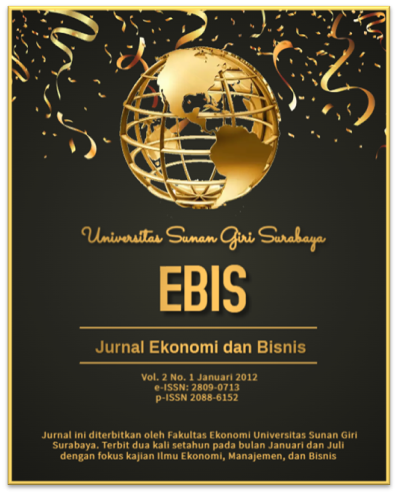Studi Empiris Tentang Hubungan Antara Keadilan Organisasi dan Keterikatan Kerja
Keywords:
Organizational Justice, Job Engagement, Organizational BehaviorAbstract
Many benefits can be felt by the organization from the job engagement of each employee. These benefits directly or indirectly also have an impact on the success of the organization. This requires organizations to pay special attention to factors supporting the realization of job engagement such as being a justice-oriented organization. The research was conducted at PT Nicepro Pratama Surabaya. The population is all employees totaling 142 people. Saturated sampling method causes all employees to become respondents in this study. All employees will be involved in collecting primary data so that all employees must respond to a questionnaire prepared according to organizational justice and job engagement variables. The analysis tool uses correlation, the results of which come from the output of the SPSS application. The results of the correlation will be explained after there is evidence for the results of the validity and reliability related to organizational justice and job engagement. The results show that there is a significantly strong relationship between organizational justice and job engagement.
References
Albrecht, S. L. (2010). Employee Engagement: 10 key questions for research and practice. In Handbook of employee engagement. Edward Elgar Publishing.
Alvi, A. K. & A.S. Abbasi. (2012). Impact of Organizational Justice on Employee Engagement in Banking Sector of Pakistan. Middle-East Journal of Scientific Research,12(5), 643-649
Andayani, D. & D. Darmawan. (2011). Determinan Variabel Kepuasan Kerja, Komitmen Organisasi, Kinerja Karyawan Sebagai Kontributor Perilaku dan Kinerja Organisasi Berbasis Keunggulan Bersaing, Jurnal Ekonomi dan Bisnis, 1(2), 35-54.
Armstrong, M. (2010). Armstrong's Essential Human Resource Management Practice: A guide to people management. Kogan Page Publishers.
Bourbonnais, R. (2007). Are Job Stress Models Capturing Important Dimensions of The Psychosocial Work Environment? Occupational and Environmental Medicine, 64(10), 640-641.
Colquitt, J. A. (2001). On the dimensionality of organizational justice: A construct validation of a measure. Journal of Applied Psychology, 86(3), 386–400.
Darmawan, D. (2008). Variabel Semangat Kerja dan Indikator Pengukurannya, Jurnal Kewirausahaan, 2(1), 43-49.
Darmawan, D. & D. Andayani. (2010). Teori Keputusan Manajerial, Metromedia, Surabaya.
Darmawan, D. (2012). Motivasi & Kinerja (Studi Sumber Daya Manusia), Metromedia, Surabaya.
Fitriyani, F. I., D. Lembong, I. Zaidi & D. Darmawan. (2011). Pengaruh Hubungan Kerja dan Kompleksitas Kerja terhadap Niat Berpindah Kerja melalui Stres Kerja. Jurnal Ekonomi, Bisnis dan Manajemen, 1(1), 23-36.
Gruman, J. A., & A.M. Saks. (2011). Performance Management and Employee Engagement. Human Resource Management Review, 21(2), 123-136.
Hassan, A. & I. H. A. A. Jubari. (2010). Organisational Justice and Employee Work Engagement: LMX as mediator. Journal for International Business and Entrepreneurship Development, 5(2), 167-178.
Hutomo, S. & D. Darmawan. (2011). Optimalisasi Manajemen Sumber Daya Manusia Menuju Keunggulan Bersaing, Jurnal Ilmu Sosial, 5(1), 13-22.
Inoue, A., N. Kawakami, M. Ishizaki, A. Shimazu, M. Tsuchiya, M. Tabata, & M. Kuroda. (2010). Organizational Justice, Psychological Distress, and Work Engagement In Japanese Workers. IAOEH, 83, 29-38.
Kahn, W. A. (1990). Psychological Conditions of Personal Engagement and Disengagement at Work. The Academy of Management Journal, 33(4), 692–724.
Khasanah, H., S. Arum, & D. Darmawan. (2010). Pengantar Manajemen Bisnis, Spektrum Nusa Press, Jakarta.
Konovsky, M. A. (2000). Understanding Procedural Justice and Its Impact on Business Organizations. Journal of Management, 26(3), 489-511.
Leiter, M. P., & A.B. Bakker. (2010). Work Engagement: introduction. Work Engagement: A handbook of essential theory and research, 1(9).
Lockwood, N. (2007). Leveraging Employee Engagement for Competitive Advantage: HR's Strategic Role. HR Magazine, 52(3), 1-11
McCain, S.C., H. Tsai, & N. Bellino. (2010). Organizational Justice, Employees’ Ethical Behavior, And Work Satisfaction In The Casino Industry. International Journal of Contemporary Hospitality Management, 22(7), 992-1009.
Nelson, D. L., & B.L. Simmons. (2003). Eustress: An elusive construct, an engaging pursuit. In Emotional and Physiological Processes and Positive Intervention Strategies, 3, 265-322.
Oetomo, H. & D. Darmawan. (2004). Pengaruh Aspek Pendidikan, Pelatihan, Umur dan Pengalaman Kerja terhadap Perilaku Gaya Kepemimpinan, Jurnal Ekonomi-Manajemen, 3(2), 11-22.
Razali, M. N. & D. Darmawan. (2006). Kepemimpinan dan Kepercayaan Diri: Kajian tentang Upaya Meningkatkan Kinerja Karyawan. Jurnal Bisnis dan Manajemen, 6(2), 145-160.
Rusman, N. S., D. Darmawan, & N. Othman. (2007). The Study of Organizational Citizenship Behavior: The Role of Professionalism and Experience. Jurnal Bisnis dan Manajemen, 7(1), 21-34.
Saks, A. M. (2006). Antecedents and Consequences of Employee Engagement. Journal of Managerial Psychology, 21(7), 600-619.
Schaufeli, W. B., M. Salanova, V. González-Romá, & A.B Bakker. (2002). The Measurement of Engagement and Burnout: A two sample confirmatory factor analytic approach. Journal of Happiness studies, 3, 71-92.
Tyler, T. R., & S.L. Blader. (2000). Cooperation in Groups: Procedural justice, social identify, and behavioral engagement. Philadelphia, PA: Psychology Press.
Wahyudi, I, D. Bhaskara, D. Darmawan, Hermawan & N. Damayanti. (2006). Kinerja Organisasi dan Faktor-Faktor Pembentuknya, Jurnal Ekonomi dan Bisnis, 4(2), 95-108.
Wang, X., J. Liao, D. Xia, & T. Chang. (2010). The Impact of Organizational Justice on Work Performance: Mediating Effects of Organizational Commitment and Leader-Member Exchange. International Journal of Manpower, 31(6), 660-677.
Xanthopoulou, D., A.B. Bakker, E. Demerouti, & W.B Schaufeli. (2009). Reciprocal Relationships Between Job Resources, Personal Resources, and Work Engagement. Journal of Vocational Behavior, 74(3), 235-244.





